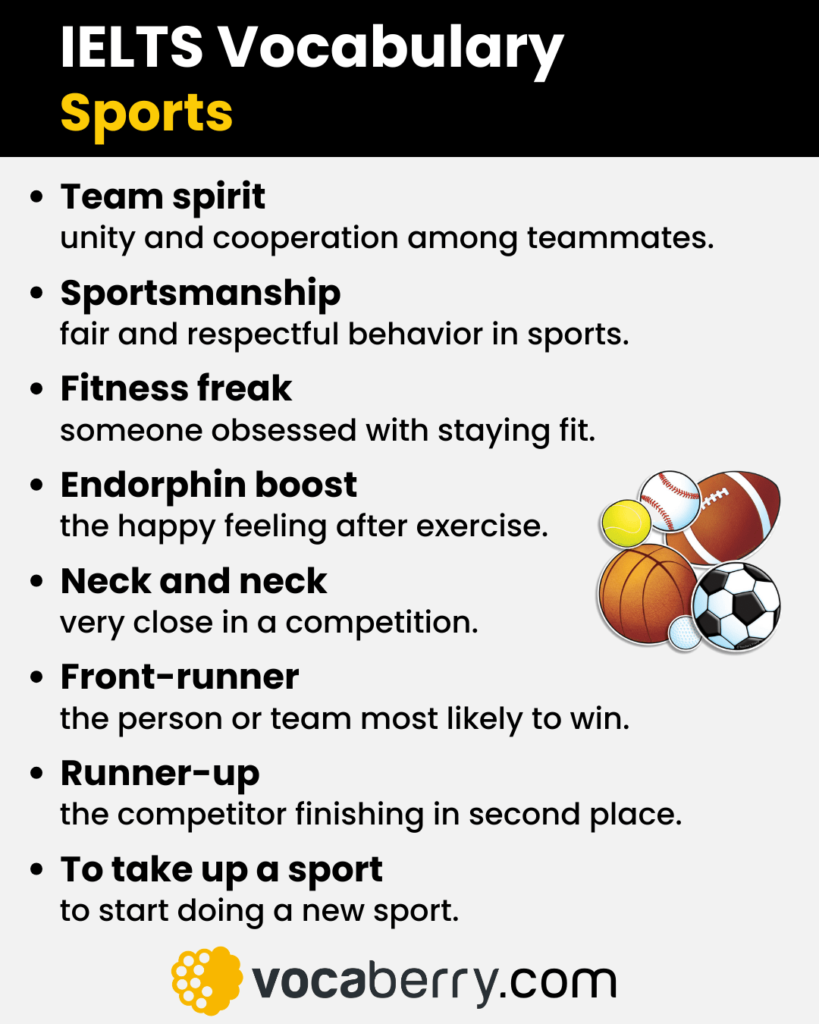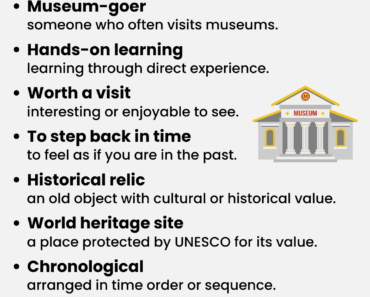
Sports are a very common topic in the IELTS Speaking test. Examiners may ask you about your favorite sport, how often you play or watch sports, or your opinions on the importance of physical activity. In this guide, you’ll learn useful IELTS vocabulary for sports with clear definitions, followed by IELTS Speaking Part 1, Part 2, and Part 3 questions with sample answers.
IELTS Vocabulary for Sports
Here is some useful IELTS vocabulary for talking about sports with clear definitions. These words and phrases will help you give better answers in the IELTS Speaking test.
- Athlete – a person trained in sports or physical activity.
- Amateur – someone who plays a sport for fun, not for money.
- Professional athlete – a person who plays sports as their career.
- Spectator – someone who watches a sports event.
- Referee / Umpire – the official who enforces rules during a game.
- Opponent – the person or team you compete against.
- Coach – a person who trains and guides athletes or teams.
- Team spirit – the feeling of unity and cooperation among teammates.
- Fan culture – the passion and traditions shared by supporters.
- Sportsmanship – fair and respectful behavior in sports.
- Competitive spirit – the desire to perform well and win.
- Winning mentality – a mindset focused on success and persistence.
- Team player – someone who works well with others in a team.
- Underdog – a competitor expected to lose but who might surprise everyone.
- Contact sport – a sport involving physical contact, such as rugby.
- Extreme sport – a risky or physically demanding sport, like skydiving.
- Individual sport – a sport played alone, like tennis or swimming.
- Team sport – a sport that involves cooperation, like basketball.
- Endurance – the ability to continue physical activity for a long time.
- Stamina – strength that helps you keep going under pressure.
- Agility – the ability to move quickly and easily.
- Coordination – the ability to control body movements smoothly.
- Strength training – exercises that build muscle and power.
- Peak performance – the highest level of ability an athlete can reach.
- Athletic performance – how well an athlete performs in competition.
- Physical fitness – being physically healthy and strong.
- Aerobic fitness – the body’s ability to use oxygen efficiently during exercise.
- Strenuous exercise – intense physical activity requiring great effort.
- Mental toughness – the ability to stay calm and focused under pressure.
- Self-discipline – control over one’s actions and habits in training.
- Determination – strong will and focus to achieve goals.
- Motivational drive – inner energy that pushes someone to improve.
- Workout routine – a planned set of exercises done regularly.
- Training session – a period of time spent practicing or improving skills.
- Fitness programme – a planned workout schedule to improve health.
- Balanced diet – eating the right nutrients for good health.
- Injury-prone – likely to get injured easily.
- Sports injury – harm caused by training or competition.
- Rehabilitation – recovery and therapy after an injury.
- Fitness freak – someone extremely enthusiastic about staying fit.
- Fitness fanatic – a person very passionate about exercise and health.
- Adrenaline rush – a sudden feeling of excitement and energy during activity.
- On top form – performing at your best level.
- Winning streak – a series of consecutive victories.
- Losing streak – a series of defeats in a row.
- Neck and neck – being at the same level as an opponent in competition.
- Front-runner – the person or team most likely to win.
- Runner-up – the competitor finishing in second place.
- Victory ceremony – an event where winners receive medals or trophies.
- Gold / Silver / Bronze medal – awards for first, second, and third place.
- Home advantage – the benefit of playing on your own field or court.
- Fan base – a group of people who are loyal supporters of a team or athlete.
- Die-hard fan – a very dedicated and passionate supporter.
- Spectator culture – the social side of watching sports events.
- Sports commentator – a person who describes live sports action on TV or radio.
- Sports facilities – places designed for physical activity, like stadiums or gyms.
- Sports industry – the business side of sports, including media and sponsorships.
- Sports icon – a world-famous athlete admired by many.
- Training ground – an area where athletes practice regularly.
- Major sporting event – a large international competition like the Olympics.
- Fair play – playing honestly and respecting the rules.
- Overtraining – exercising too much without enough rest.
- Personal best – the best result a person has ever achieved.
- Pre-match nerves – anxiety or tension before a competition.
- Endorphin boost – the happy, energized feeling after exercise.
- Team dynamics – how well players cooperate and communicate.
- Performance-enhancing drugs (PEDs) – illegal drugs used to boost performance.
- Sports sponsorship – financial support for athletes or sporting events.
- To warm up – to do light exercises before intense activity.
- To cool down – to do gentle stretches after exercise to relax muscles.
- To get into shape – to become fit and healthy through exercise.
- To stay in shape – to keep your body fit and healthy.
- To keep fit – to stay active and healthy through exercise.
- To take up a sport – to start doing a new sport.
- To be into sports – to be enthusiastic or passionate about sports.
- To train hard – to practice intensively to improve performance.
- To set a record – to achieve the best result in a sport.
- To break a record – to beat a previous best result.
- To win by a narrow margin – to win by a very small difference in score.
- To suffer a defeat – to lose a match or competition.
- To bounce back – to recover quickly from a loss or injury.
- To knock out – to eliminate an opponent from a competition.
- To qualify for – to meet the standard required to enter the next round.
- To warm the bench – to stay as a substitute without playing.
- To perform under pressure – to stay focused and do well under stress.
- To push your limits – to go beyond what you thought possible.
- To build muscle – to increase muscle strength and size through exercise.
- To burn calories – to use energy through physical activity.
- To lift weights – to use heavy equipment to build strength.
- To be disqualified – to be officially removed from a competition for breaking rules.
- To host a tournament – to organize and hold a sports event.
- To take victory gracefully – to win politely and humbly.
- To blow away the competition – to defeat opponents easily or by a large margin.
- To run the marathon – to complete a long-distance race, usually 42 km.
IELTS Speaking: Sports Questions & Answers
In this section, you’ll find IELTS Speaking Part 1, Part 2, and Part 3 questions on sports with sample answers. These examples show how the sports-related vocabulary can be used in your responses during the test.
IELTS Speaking Part 1 – Sports
Do you like playing or watching sports?
Yes, I really do. I’ve always been a sports fanatic, especially when it comes to football. Watching live games gives me such an adrenaline rush, and I love the team spirit that comes from supporting a club with a strong fan base.
How often do you play sports or exercise?
I try to stick to a regular fitness programme. I usually go to the gym three times a week for strength training and cardio. Staying active helps me maintain my physical fitness and endurance, and it’s a great way to burn calories and stay in shape.
What kind of sports do you like the most?
I’m really into team sports like football and basketball. They teach sportsmanship and cooperation, and the team dynamics make every game more exciting. It’s also motivating to push yourself alongside others who share the same winning mentality.
Have you ever taken part in a competition?
Yes, I have. A few years ago, I joined a local marathon. It was quite a challenge, but it really tested my mental toughness and stamina. I didn’t win, but crossing the finish line felt like achieving a personal best, and that gave me a huge endorphin boost.
Do you think sports are important for people?
Definitely. Playing sports develops discipline, determination, and a sense of fair play. It’s also essential for good aerobic fitness and mental health. Whether someone is an amateur or a professional athlete, sports teach valuable life skills that go beyond the field.
IELTS Speaking Part 2 – Sports Cue Card
Describe a sport you enjoy watching or playing.
You should say:
- what the sport is
- how often you play or watch it
- who you play or watch it with
- and explain why you enjoy it
Sample Answer:
The sport I really enjoy playing is basketball. I started playing it in high school, and since then, it’s become one of my favorite ways to stay active. These days, I play about twice a week with a group of friends from work. We usually meet at a local sports facility that has an indoor court, which means we can play all year round, even when the weather isn’t great.
Before every game, we make sure to warm up properly and do a few light drills. Basketball is quite fast-paced, so agility, coordination, and stamina are essential. It’s also a great way to burn calories and maintain good physical fitness. What I love most about it, though, is the strong sense of team spirit. Everyone has to communicate and cooperate constantly, and that team dynamic is what makes the game so exciting.
I usually play as a shooting guard, so I’m responsible for scoring and supporting the offense. There are moments when the match is neck and neck, and I have to perform under pressure, which can be both stressful and thrilling at the same time. Winning a tough game gives me an amazing endorphin boost, but even when we lose, I try to take defeat gracefully because sportsmanship is just as important as winning.
I also enjoy watching professional basketball, especially major tournaments like the NBA Finals. Seeing professional athletes play at their peak performance level is incredibly inspiring. I admire their discipline, determination, and winning mentality, as they train for hours every day and never seem to lose focus.
Overall, basketball isn’t just a way for me to stay fit; it’s something that builds confidence, improves teamwork, and helps me push my limits every time I step on the court. It’s a perfect mix of challenge, excitement, and personal growth.
IELTS Speaking Part 3 – Sports Discussion
IELTS Speaking Part 3 questions about sports often ask you to compare individual and team activities, discuss the benefits of exercise, and share your opinions on topics such as fitness, competition, and the influence of sports on society.
How can playing sports help people in their daily lives?
Playing sports teaches skills that go far beyond the playing field. It helps people develop discipline, mental toughness, and the ability to perform under pressure, which are valuable in both work and personal life. When you play regularly, you learn to push your limits and stay motivated even when things get tough. Team sports, for example, build team spirit and communication skills, while individual ones strengthen self-discipline and focus. Sports also improve aerobic fitness, reduce stress, and give people an endorphin boost, helping them maintain a healthy balance between their body and mind. Personally, I think anyone who plays sports regularly becomes more determined, organized, and positive in everyday life.
How do sports influence people’s physical and mental health?
Sports play a crucial role in improving both physical fitness and mental well-being. On a physical level, regular exercise boosts stamina, aerobic fitness, and overall endurance. Mentally, it helps people perform under pressure and develop mental toughness, which can be useful in many aspects of life. When people engage in sports regularly, they also experience an endorphin boost, which helps them relieve stress and maintain a positive mindset. Furthermore, team sports enhance team spirit and cooperation, while individual sports strengthen self-discipline. In short, sports shape not only the body but also build character and emotional resilience.
Why do some people choose individual sports while others prefer team sports?
It really depends on people’s personalities and what they want to gain from the experience. Those who enjoy team spirit and a sense of belonging often prefer games like football or basketball, where communication and cooperation are key. On the other hand, people who value independence or want to focus on self-discipline might lean towards individual sports like running or swimming. Personally, I think both are beneficial. Team sports teach you to rely on others and build sportsmanship, whereas individual ones help you set personal goals and push your limits. It’s more about how people connect with the activity rather than the sport itself.
Do you think competitive sports are too focused on winning these days?
Unfortunately, yes. In many cases, winning has become the main priority, which sometimes overshadows the true purpose of sports. Athletes are under immense pressure to perform, and that can lead to unhealthy behaviors like using performance-enhancing drugs (PEDs). While competition is an important part of sports, I think the focus should be on fair play, sportsmanship, and personal growth. When athletes compete purely to win, they often forget the joy of the game and the lessons it teaches about discipline and teamwork. Balancing ambition with integrity is what keeps sports meaningful and inspiring.
More IELTS Vocabulary Topics
If you found this lesson useful, explore other IELTS Speaking topics to expand your vocabulary and practice with sample answers:
- IELTS Vocabulary: Accommodation
- IELTS Vocabulary: Advertisement
- IELTS Vocabulary: Animals
- IELTS Vocabulary: Art
- IELTS Vocabulary: Artificial Intelligence
- IELTS Vocabulary: Books
- IELTS Vocabulary: Childhood
- IELTS Vocabulary: Crime and Punishment
- IELTS Vocabulary: Culture and Traditions
- IELTS Vocabulary: Daily Routine
- IELTS Vocabulary: Education
- IELTS Vocabulary: Environment
- IELTS Vocabulary: Family
- IELTS Vocabulary: Fashion and Clothes
- IELTS Vocabulary: Films
- IELTS Vocabulary: Food & Diet
- IELTS Vocabulary: Friends
- IELTS Vocabulary: Gifts
- IELTS Vocabulary: Health
- IELTS Vocabulary: Hobbies
- IELTS Vocabulary: Hometown
- IELTS Vocabulary: Money
- IELTS Vocabulary: Museums
- IELTS Vocabulary: Music
- IELTS Vocabulary: Plants
- IELTS Vocabulary: Shopping
- IELTS Vocabulary: Social Media
- IELTS Vocabulary: Technology
- IELTS Vocabulary: Transport
- IELTS Vocabulary: Travel
- IELTS Vocabulary: Weather
- IELTS Vocabulary: Work & Jobs






